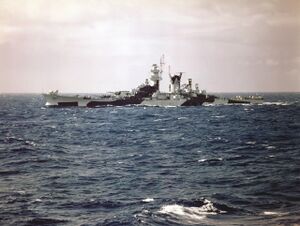War of the Equatorial Strait: Difference between revisions
(Created page with "{{Infobox military conflict | conflict = War of the Equatorial Strait | image = HMDSIndomitable.jpg | caption = HMDS Indomitable en route to the Equatorial Strait...") |
mNo edit summary |
||
| (One intermediate revision by the same user not shown) | |||
| Line 7: | Line 7: | ||
| result = Inconclusive<br/>Destabilization of Soltenia<br/>[[Dzofeland Emergency]] in Dwetasia | | result = Inconclusive<br/>Destabilization of Soltenia<br/>[[Dzofeland Emergency]] in Dwetasia | ||
| combatant1 = [[Union of Socialist Soltenish Republics]] | | combatant1 = [[Union of Socialist Soltenish Republics]] | ||
| combatant2 = [[Dwetasia | Kingdom of Dwetasia]] | | combatant2 = {{flagicon|Dwetasia}}[[Dwetasia|Kingdom of Dwetasia]] | ||
| commander1 = '''Vittorio Tronella'''<br/>Alesso Fermi | | commander1 = '''Vittorio Tronella'''<br/>Alesso Fermi | ||
| commander2 = '''Baptiste II Fayard'''<br/>Richard DeSofte, Count Dzofeland | | commander2 = '''Baptiste II Fayard'''<br/>Richard DeSofte, Count Dzofeland | ||
| Line 15: | Line 15: | ||
| casualties2 = ships sunk | | casualties2 = ships sunk | ||
}} | }} | ||
The '''War of the Equatorial Strait,''' also known as the '''Equator Strait War''' or the '''Soltenish-Dwetasian War''', was a naval conflict waged between the [[Dwetasia | Kingdom of Dwetasia]] and the [[Union of Socialist Soltenish Republics]] between | The '''War of the Equatorial Strait,''' also known as the '''Equator Strait War''' or the '''Soltenish-Dwetasian War''', was a naval conflict waged between the {{flagicon|Dwetasia}}[[Dwetasia | Kingdom of Dwetasia]] and the [[Union of Socialist Soltenish Republics]] between 1963 and 1966. Armed conflict had been brewing for some time in the [[Aestas Sea]], as the staunchly anti-communist Kingdom of Dwetasia attempted to assert greater influence over the waves. This irredentist sentiment produced overlapping claims on the [[Greater Aestas Islands]], which were controlled by communist Soltenia. This war is notable for being the last major use of battleships and other gun-carrying capital ships in [[Anteria | Anterian]] naval warfare. As a result of the employment of these obsolete technologies, many historians and naval strategists have, in retrospect, come to believe that many of the ships sunk during the war could have survived if both sides employed more modern tactics for the time. | ||
(Work In Progress) | (Work In Progress) | ||
Latest revision as of 03:55, 21 November 2022
| War of the Equatorial Strait | |||||||
|---|---|---|---|---|---|---|---|
 HMDS Indomitable en route to the Equatorial Strait, 1964 | |||||||
| |||||||
| Belligerents | |||||||
| Union of Socialist Soltenish Republics |
| ||||||
| Commanders and leaders | |||||||
|
Vittorio Tronella Alesso Fermi |
Baptiste II Fayard Richard DeSofte, Count Dzofeland | ||||||
| Strength | |||||||
| ships | ships | ||||||
| Casualties and losses | |||||||
| ships sunk | ships sunk | ||||||
The War of the Equatorial Strait, also known as the Equator Strait War or the Soltenish-Dwetasian War, was a naval conflict waged between the ![]() Kingdom of Dwetasia and the Union of Socialist Soltenish Republics between 1963 and 1966. Armed conflict had been brewing for some time in the Aestas Sea, as the staunchly anti-communist Kingdom of Dwetasia attempted to assert greater influence over the waves. This irredentist sentiment produced overlapping claims on the Greater Aestas Islands, which were controlled by communist Soltenia. This war is notable for being the last major use of battleships and other gun-carrying capital ships in Anterian naval warfare. As a result of the employment of these obsolete technologies, many historians and naval strategists have, in retrospect, come to believe that many of the ships sunk during the war could have survived if both sides employed more modern tactics for the time.
Kingdom of Dwetasia and the Union of Socialist Soltenish Republics between 1963 and 1966. Armed conflict had been brewing for some time in the Aestas Sea, as the staunchly anti-communist Kingdom of Dwetasia attempted to assert greater influence over the waves. This irredentist sentiment produced overlapping claims on the Greater Aestas Islands, which were controlled by communist Soltenia. This war is notable for being the last major use of battleships and other gun-carrying capital ships in Anterian naval warfare. As a result of the employment of these obsolete technologies, many historians and naval strategists have, in retrospect, come to believe that many of the ships sunk during the war could have survived if both sides employed more modern tactics for the time.
(Work In Progress)